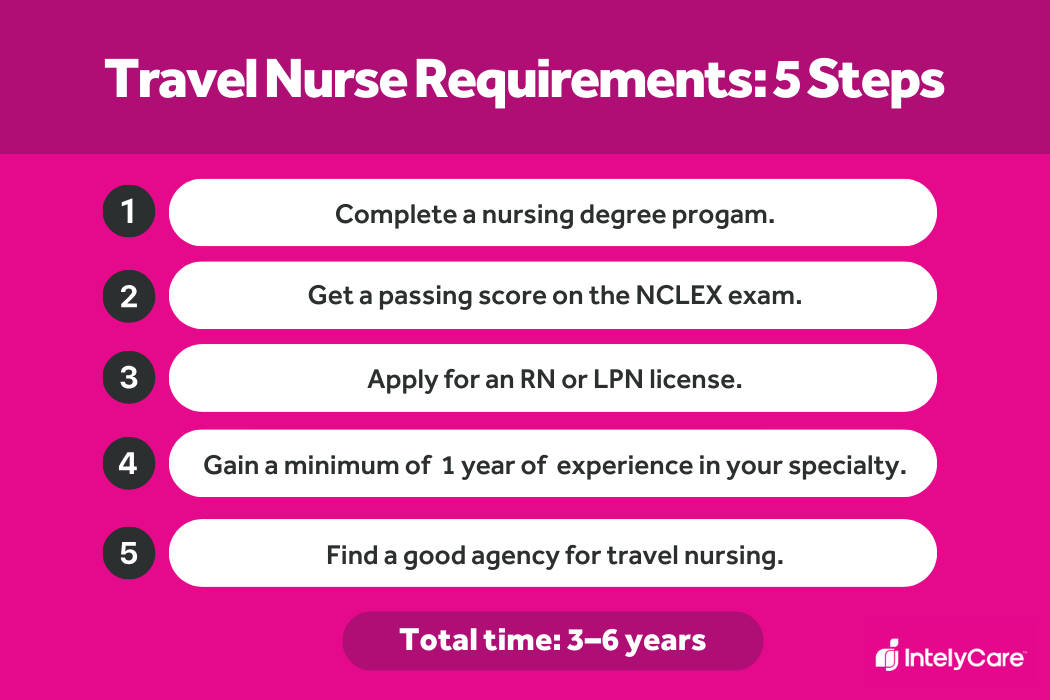How to Become a Travel Nurse

If you’re the kind of person who likes variety on the job, living in different places, and working with new people, you may be interested in how to become a travel nurse. It’s a great way to boost your skill set, grow your network, and serve people who are in great need of your expertise.
We’ll take a look at the basics of what it takes to become a travel nurse, including education and licensing requirements, plus the types of facilities that might employ you and what you can expect to earn in this vital healthcare role.
What Is a Travel Nurse?
A travel nurse is a licensed nurse, such as a nurse practitioner (NP), registered nurse (RN), or licensed practical nurse (LPN) who is hired on a contract basis by travel nursing agencies to fill urgent staffing needs in a medical facility. Certified nursing assistants (CNAs) can also work on a traveling schedule.
Travel assignments can last anywhere from 4 to 26 weeks and are located across the country — and even in your own city. Working as a travel nurse, you can make your own schedule, choose where you take jobs, and get experience in different types of facilities.
If you’re wondering how to become a travel nurse, you should know that these skilled professionals have the same licensure and education requirements as staff nurses. They tend to bring at least one or two years of experience, which allows them to practice confidently in different units.
Housing Options for Traveling Nurses
You may be wondering where you’d live as someone who travels routinely for their job. There are a few options for travel nurse housing. Agencies typically provide either stipends or furnished accommodations for travel nurses. With a stipend, you find your own housing. This gives you the freedom to explore your options in terms of neighborhood as well as the amount of space you’d need. With agency-placed housing, you don’t need to spend any time or energy searching; you simply move in.
What Do Travel Nurses Do?
The duties of a travel nurse are predominantly the same as that of an RN or LPN but travel nurses have the added responsibility of stepping into a new situation and adapting extremely quickly. This is one of the main tenets of learning how to become a travel nurse.
Check out this travel nurse resume sample for more insight into the typical responsibilities you can expect in this role. To get even more detail, explore some of the current openings for these popular travel roles:
Why Are Travel Nurses Needed?
The job market for travel nurses fluctuates for a variety of reasons, but primarily to accommodate the number of patients in a given area. For example, a facility may rely on travel nurses:
- To prepare to treat a surge of patients during flu season
- To provide clinical specialty support in an understaffed location
- To cover shifts for core staff during leaves of absence
Travel nursing needs can also be urgent when there is an unexpected influx of patients — as occurred during the COVID-19 pandemic — or nursing strikes that leave facilities without staff. In order to provide sufficient care for a population, travel nurses are called upon to go where the needs are greatest.
What Are the Benefits of Travel Nursing?
Travel: This one seems obvious, but one of the biggest draws of travel nursing is the ability to see new places and choose where you want to work and live. If you choose to work internationally, you can also receive assistance obtaining a passport and work visa. Most contracts also offer travel reimbursements.
Competitive Pay and Benefits: On average, the travel nurse pay is higher than the pay for a standard RN position, and may include bonuses, but this will depend on where you choose your contract. There is also an opportunity to receive benefits including medical, dental, and vision insurance, as well as retirement plans, in contract nursing jobs.
Flexibility: Travel nursing will likely not have the same flexibility that per diem nursing jobs offer — where you can pick and choose your shifts to build out your schedule on your terms — but there is a lot of flexibility to change locations. Furthermore, you are in control of which contract you pick and where you travel to next. With contracts being as short as four weeks, you could move to several different places and facilities over the course of a year.
Try Before You Buy: The travel nurse setup is ideal if you’ve been considering relocating but wondered what the reality of day-to-day living is like outside of your area. What’s there to do during your downtime? Is it more or less expensive to live there compared to where you are now? Is it culturally diverse? What do people who live there enjoy most about the area? Do most nursing professionals in the area work full time or per diem? You can get first-hand answers to all these questions without making a long-term commitment. Think of it like a test drive.
What Are the Downsides of Travel Nursing?
High Stakes: Yes, all nursing jobs are stressful. But for this job in particular, you must thrive under pressure. Again, travel nurses are typically brought in due to a great need, so there is a sense of urgency that comes with the job.
Possible Lack of Resources: Travel nurses are often walking into understaffed, underserved, and unfamiliar spaces and must quickly get up to speed and provide the help that they were hired to give.
Training May Be Scant: Depending on the facility, there may be very little orientation provided. Travel nurses need to work independently and have the competence and confidence to take care of any patient in their specialty with very little on-the-job training.
How to Become a Travel Nurse
Before reaching out to a travel nurse staffing agency, you’ll need to gain experience. Complete the following travel nurse requirements to prepare yourself for this role:

Want more detail on how to become a travel nurse? Let’s take a deeper look at the steps required.
1. Complete a Nursing Degree From an Accredited Program
The journey of how to become a travel nurse (for RNs) starts with earning either an associate degree in nursing (ADN) or a bachelor of science in nursing (BSN) from a nationally accredited nursing program. An ADN takes approximately two years to complete, whereas a BSN degree — a more intensive course of study — takes approximately four years. You can also opt for an accelerated BSN if you already have a bachelor degree in a field other than nursing. This route can take as little as 20 months. Note that for some travel RN jobs, a BSN will be preferred.
2. Pass the NCLEX-RN or NCLEX-PN Exam
Once you’ve finished your nursing program, you need to sit for the National Council Licensure Examination (NCLEX-RN) for registered nurses. New graduate nurses must pass this computerized exam to obtain an RN license. The NCLEX-PN is the version of this exam for LPNs. Learn how to prepare for the NCLEX.
3. Apply for an RN or LPN License
In addition to passing the NCLEX, you must also meet all requirements issued by the board of nursing in your particular state. This may include fingerprints, background check, good moral character, and other state licensing requirements. You will then be permitted to apply for a nursing license (note that you will have to pay a processing fee). Go to the state nursing board for licensure requirements.
4. Gain a Minimum of One Year of Clinical Work in Your Nursing Specialty
Most facilities prefer to hire nurses who have some clinical experience under their belts. For this reason, you’ll want to work for at least a year or two in your specialty area as an RN or LPN. Some facilities might accept a nurse with just one year of experience, but two years is preferred because it gives a nurse time to learn important skills like time management, in addition to the clinical skills necessary for a given specialty. The more experience a nurse has before traveling, the better.
Also consider obtaining certifications such as basic life support (BLS) and advanced cardiovascular life support (ACLS), as some travel nursing agencies may require you to have these certifications. For more insights into possible requirements, check out this sample job description for a travel nurse.
5. Find a Good Agency for Travel Nursing
An agency like Aya Healthcare or American Traveler can help you secure a contract and place you in a job in a hospital, clinic, or other type of medical facility. You might be paired with a recruiter who can help connect you with your preferred type of assignment. Do your due diligence when researching staffing agencies. Ask them for a sample travel nurse contract and review the details including (but not limited to):
- The start and end dates of the contract
- Travel reimbursement
- Meals and incidentals
- Job expectations
- The schedule and shift type
- Any on-call requirements
- The pay structure, including any bonus or overtime rates
- What types of benefits are offered to you, such as time off
- What options you have for housing
- What kinds of support services (if any) they provide to their travel nurses
Travel Nursing FAQs
What are some good skills to have as a travel nurse?
This job isn’t for everyone. Travel nurses must be able to excel in new environments, easily pick up new processes and protocols, and be open to new experiences. If you’re interested in this job, you need to have excellent clinical, analytical, and communications skills, be cool under pressure, and work well with a team. And, of course, you must care deeply for the wellbeing of your patients.
Do I need to get a different nursing license for every state I travel to?
If you’re wondering how to become a travel nurse in a different state, know that you will need an additional license. Some states are part of the Nursing Licensure Compact (NLC), which allows nurses to obtain a multi-state license to work in any state that is part of the compact. Otherwise, you will have to transfer your nursing license to a new state in order to be able to legally practice there. A travel nurse agency might be able to assist with the process.
How long does it take to become a travel nurse?
Typically, it takes anywhere from three to six years to become a travel nurse. That includes your formal schooling, plus an additional year of on-the-job clinical experience.
How much do travel nurses make?
Travel nurses are known for making a higher salary than staff nurses. The average base travel nurse salary is around $73,375 per year, and can reach upwards of $90,000. The areas with the highest travel nurse pay include:
- Alaska
- California
- Washington D.C.
- New Jersey
- Massachusetts
For a better idea of what you might earn, check out all the travel nurse jobs on IntelyCare available now.
Where are travel nursing assignments located?
One of the best parts about being a travel nurse is that you realize you can work nearly anywhere. Your assignments can take you across the country and back again. Once you connect with a travel nurse staffing agency, you’ll be able to pick where you’d like to be assigned and in what facility.
According to the Bureau of Labor Statistics, the most common work environments for RNs are state, local, and private hospitals. However, there is also a need for dedicated nurses to join the post-acute space. The skills a travel nurse brings to the table can make a world of difference to patients in the following types of facilities:
- Nursing homes and residential care facilities
- Rehab facilities
- Home health care
- Outpatient surgery centers
- Extended care facilities
- Private practices
- Other clinical facilities
For more examples of where nurses can find employment, check out all the different nursing jobs that are available on IntelyCare now.
7 Travel Nurse Tips For a Successful Contract
Learning how to become a travel nurse is just the beginning. Once you’re a working travel nurse, here are some tips to follow to have the best experience:
- Don’t get discouraged. If you’re a first-time traveler, know that getting your first contract will likely be the hardest. Keep applying, even if you get rejected.
- Thorough research. Before you sign a contract, investigate the facility, location, and community to be sure it aligns with your expectations. You might ask about other nurses’ experiences on online forums, or through your nursing connections.
- Clarify contract details. Be sure to thoroughly review your travel contract before signing, even if your recruiter has put a deadline in place. You won’t regret clarifying any details that seem amiss. Use the General Services Administration website to compare your stipend rates, and be sure to understand how your pay will impact your tax situation.
- Investigate your housing options. While your contract might provide housing, checking out the local options is a good idea. Some booking sites cater to traveling medical professionals, and you might be able to get a better deal than your contract offers.
- Stay positive. It’s not uncommon for travel RNs to experience high ratios and little staff support. In these instances, you’ll need to rely on your training and experience. If the work gets stressful, try to stay positive and remember you’re only there for a short time.
- Explore a new location. One of the benefits of travel nursing is seeing new places, and experiencing them like a resident. During your off days, explore attractions and get a sense of the local culture.
- Pitch in. It might be tempting to isolate yourself since you’re on the unit for a short period. Building connections with other clinicians, even during a contract, is a great way to be a team player and keep patients safe. You might even make some new nurse friends.
Make Your Career Work for You
Learning how to become a travel nurse no doubt highlights the perks of the job. Want more options in your career right now? Learn how IntelyCare can match you with nursing jobs in your desired specialty and facility type. Sign up today!

